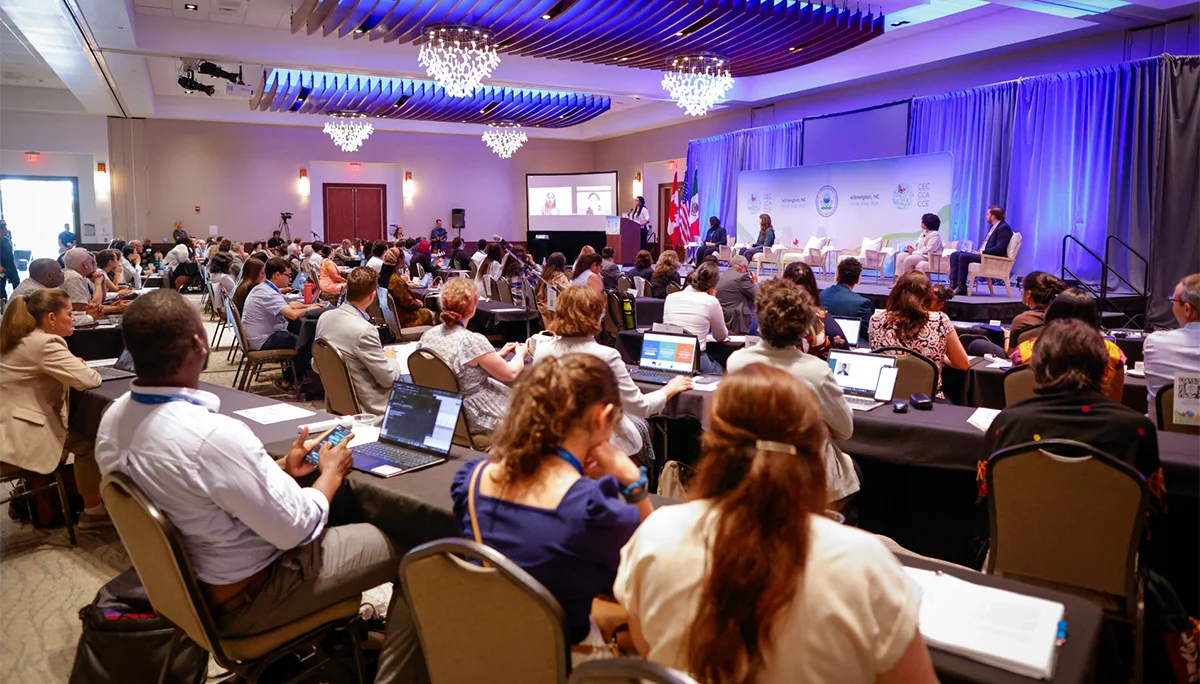Summer Rewind: Looking back at CEC31 — Event Recordings, Summaries & Photos
We would like to thank everyone who participated in #CEC31 earlier this summer, whether you joined us in Wilmington, North Carolina, or virtually. This year, 2024, also marks the CEC’s 30th anniversary, which made it a special occasion to reflect upon and celebrate three decades of successful regional environmental cooperation.
The 31st annual Session of the Commission for Environmental Cooperation Council and JPAC Public Forum brought together the top environmental officials from Canada, Mexico and the United States, as well as representatives from Indigenous Peoples and local communities, environmental justice advocates and activists, youth leaders, experts and the public at large under the theme “Strengthening Environmental Justice through Community Empowerment.”
You can now view and share the broadcasts from the three-day event:
- JPAC Public Forum on Advancing Environmental Justice in North America (Session 1 and Session 2)
- CEC Presentation on Environmental Justice Work: Air Quality Improvement for Environmental Justice and North American Pollutant Release and Transfer Register (PRTR) Initiative
- Youth Panel: Bridging the Gap — A Conversation on the Generational Fight for Environmental Justice
- Expert Roundtable with the CEC Executive Director: Environmental Justice: Origins, Evolution and Emerging Policy in North America
- CEC Presentation on Environmental Justice Work: EJ4Climate Grant Program and Communities for Environmental Justice Network
- Council Public Meeting on Strengthening Environmental Justice through Community Empowerment
The first day also featured the CEC’s Voices of our Collaborators video, showcasing the spirit of collaboration across North America, celebrating the value of collaboration, highlighting diverse voices from the three countries and emphasizing the importance of cooperation in supporting conservation and community action and resilience.
During this year’s Council Public Meeting, the Council introduced the first cohort of the Generation of Environmental Leaders Program (GELP). The youth teams presented their bold solutions to support North American communities and preserve our shared waters, lands and air.
Notably, the Council announced C$500,000 to establish a North American Environmental Justice Action Center (NAEJAC), which will be a resource platform to bring together community representatives, advocates and public officials from across the three countries to share and leverage best practices, tools and training to advance environmental justice.
The Council also committed US$1.5 million to a fourth cycle of the CEC’s EJ4Climate Grant Program.
The Council also announced a number of other new projects and initiatives to advance North American environmental cooperation, on monarch butterfly science, cross-border hazardous waste transfers, fighting food loss and waste and the environmentally sound management of used lead acid.
The Secretariat thanks everyone for engaging by sharing questions and comments either in person or virtually and on social media and for using our event hashtags (#CEC31, #CCA31, #CCE31) with more than 1000 posts shared by the CEC community, totaling an event hashtag reach of more than 8.8 million people across the three languages!
We encourage you to share your feedback and experiences from this event by taking part in our short survey, as we strive to continually improve our events every year. We highly value and appreciate your insights and comments.
We would also like to thank the US Environmental Protection Agency and the United States for hosting the 31st CEC Council Session. We are looking forward to seeing all of you at next year’s annual Council Session and JPAC Public Forum in Mexico!
To learn more about the discussions at #CEC31, please explore the Council Summary Record available here.
You can view photos from the event here.
If you would like to know more about CEC initiatives, opportunities and efforts, you can sign up for our newsletter and follow us on social media.

About the CEC
The Commission for Environmental Cooperation (CEC) was established in 1994 by the governments of Canada, Mexico and the United States through the North American Agreement on Environmental Cooperation, a parallel environmental agreement to NAFTA. As of 2020, the CEC is recognized and maintained by the Environmental Cooperation Agreement, in parallel with the new Free Trade Agreement of North America. The CEC brings together a wide range of stakeholders, including the general public, Indigenous people, youth, nongovernmental organizations, academia, and the business sector, to seek solutions to protect North America’s shared environment while supporting sustainable development for the benefit of present and future generations
The CEC is governed and funded equally by the Government of Canada through Environment and Climate Change Canada, the Government of the United States of Mexico through the Secretaría de Medio Ambiente y Recursos Naturales, and the Government of the United States of America through the Environmental Protection Agency.